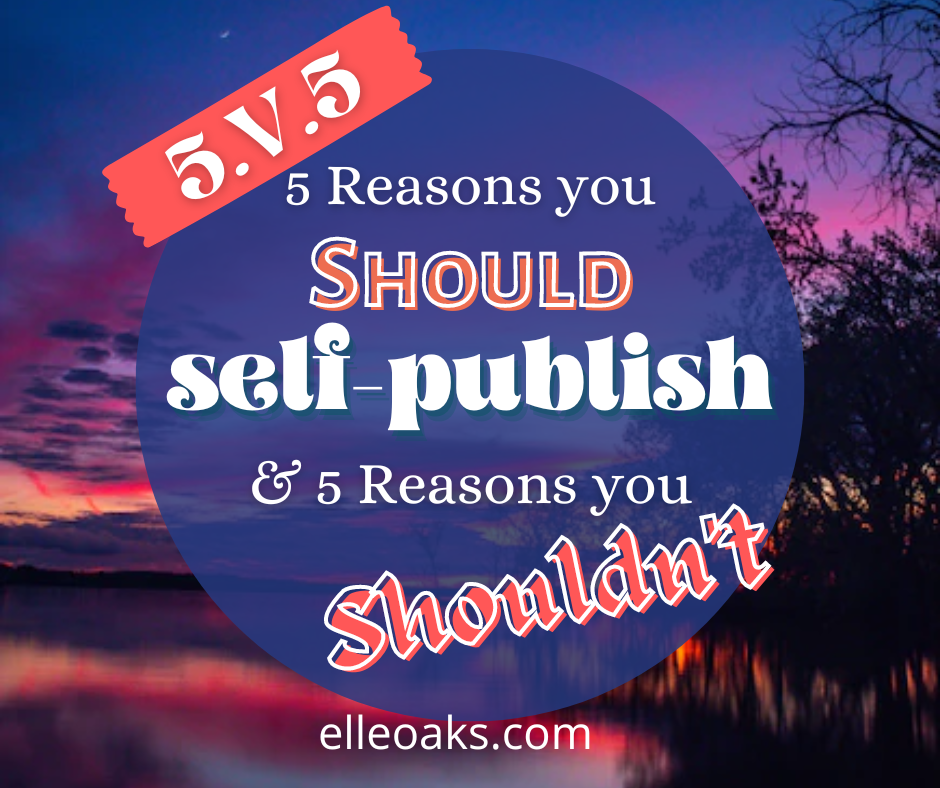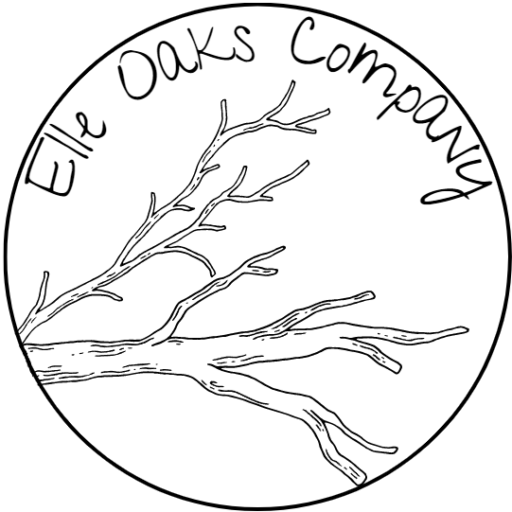The decision to self-publish is about much more than being a writer. When you decide to self-publish, you are embarking as an entrepreneur, starting a business, committing to learn much more than simply writing a book. To help decide if self-publishing is right for you, I’ve put together a list of the pros and cons of self-publishing.

Have you ever read a traditionally published book and thought, “Hey, I could write this story 5 times better.” You’re not alone. Many writers start because they struggle to find a certain story they’re looking for. And when you’ve got a fantastic idea, best way to get it out is to write it down.
Now you’ve got that story in front of you, and you want to publish it, get it out to the world. There are two paths a person can take. Traditional publishing, which involves finding an agent or editor interested in your work. Once you’ve achieved representation, the next step requires an established publisher to buy in to your work and distribute it for you.
Another path is to self-publish your book. This requires you as the author to become your own representation. You’ll likely do research, create a checklist of all that needs done, and, if you make it to the end without fizzling out, you find a way to distribute your work to readers.
While both paths have the same end goal (getting your books in front of an audience) the paths are quite different. We won’t be breaking down the leg work of going one way or another (that can be found in an upcoming post so stay tuned!). We’re going to take a look at why you would choose to pursue one path or another. Hopefully this will get you the info you need to make that decision before wasting your time. That is, more time for writing more stories.
Here we go:
5 Pros and Cons of Self Publishing
Pro #5: Write what you love
When deciding what kind of book to write, many writers start out with an idea. This idea can come from any number of influences in their lives, from any and all forms of media. And the motivation to get that idea on to paper is all about the excitement of unraveling a story that you as the author will find enjoyable and want to read yourself.
Unfortunately, as a traditionally published writer (and even sometimes as a self-published writer) this is not the case.
If you hang around in writer circles, you’ll often hear talk of “write to market.” This requires paying attention to trends and seeing what is capturing people’s attention, what’s selling well, what people want to read. This trend can be in total contrast to that new shiny idea you want to write. And though the market will eventually come back around, traditional publishers don’t take those risks without evaluating the possibility of a book selling well. Perhaps it’s a perfect book in content but it’s not a wise decision to take on and pay an advance for a book that won’t sell out.
But, when you are your own boss, you get to write whatever you want. Who cares what is popular? Maybe vampires are in but you’ve got a killer werewolf story. Who needs another fairytale retelling when you just put a new spin on Shakespeare? As the writer, and boss, you get to choose and make the ultimate call.
Con #5 Research, a lot of research
Despite the fun you have writing, self-publishing is a lot more than just pumping books out. It requires a ton of research not just to initially self-publish but to continue to do so.
Most authors will tell you that it is difficult to make writing a full time job. But, if that is that long term goal for you, you will have to learn a lot more than how to write a great book if you take the self-publishing route.
A self-published author does need to look at trends. Needs to analyze where to spend on ads to get more traffic, more sell through, take courses to stay up to date on formatting and trope and genre expectations. The first book will require much more than the rest as you decide on how you’ll distribute, how to set goals, which groups to be a part of. So many things!
And speaking of distribution…
Pro #4 Ease of access distribution
It is easier now than ever to self-publish your book due to distribution hubs. Whether you choose to distribute through one channel like Amazon or go wide with a distributor like Draft2Digital or Ingram Spark, you can get your books out there so easily!
Before jumping into it, be sure you know the info needed to publish on the platform you’re using. (I’m working on checklists for Amazon and Draft2Digital and those are my go tos, so stay tuned!) Again, you’ll need more than just a polished manuscript to publish, but even then, these sites break it down and make it so simple.
When going wide (offering to marketplaces outside of a single one), Draft2Digital makes it so easy at the click of a button you can get your book into Barnes and Noble, Kobo, Apple, and much more. It’s easy to offer promos and edits for ebooks are unlimited and free!
The set up does take time, so it needs to be a scheduled slot where you can sit down and focus on the details, which brings us to the next con…
Con #4 Loss of time to actually write
When you self-publish, you commit to more than just writing. You are committing yourself to the entire lifecycle of the book from first draft to going live. This means you have to manage edits, commission or commit to drawing book covers, creating ads and other promotional materials.
This is all takes time. Time away from your precious writing projects.
Time is a valuable commodity, in fact, there’s only so much of it you can use up everyday. And for most writers, time is critical. It can make or break a deadline. It can make a bad day a horrible day. Time is a currency, one that you pay into. You are either willing to use your time or decide to prioritize different things that mean more. If self-publishing is not a passion, your time may be better spent elsewhere.
Pro #3 Involve yourself in the process and be proud
There is always a sense of pride when you can finally hit that publish button. After you’ve poured every bit of yourself into a process to see a story come to life, it would be a shame to not feel that sense of pride.
Learning is never to be discouraged. The skill you learn when on the journey of self-publishing are diverse and require patience and practice. These skills go with you wherever you go next in life, into the workplace, home life. There are so many valuable skills to be learned along the way.
Embrace it. Enjoy it.
Con #3 No advances
A huge reason why many will want to follow the traditional route rather than the self-publish is because of shiny advances. An advance is money given in order to publish and distribute your works, essentially giving the rights for a company to collect the royalties. The author won’t get any royalties on their book until they earn out their advance. This means the publisher has earned back in sales what they invested in the book. With any further sales, the author (and their agent) with see a small portion of the royalties granted to them.
Self-published authors do not get advances.
It is typically expense one after another. And often a self-published author may not recover what is spent for years, possibly never earning out. This means that traditionally published authors will make something from their manuscript, no matter its success in the marketplace.
But, this brings us to a pro.
Pro #2 Profit (Royalties)
Traditional publishing works in advances, typically the payment is split up between three checks and is a set amount until the author has earned out. Because of the low advances, some authors are turned away from traditional publishing for this sole reason.
Self-publishing has some expenses up front, but if you play your cards right, the odds of making a decent wage are much greater than in a traditional setting.
Though not immediate, you start earning as soon as your book starts selling. You set the price. You decide the sales. You get to choose your ads and marketing to make it work for you. And the royalties earned are far greater since payment doesn’t go through a publisher first. Distribution sites will take a small cut, but nowhere in comparison to a publisher.
And if you follow this route, you’ve likely earned every penny (and still deserve a few more).
Because you are the foundation for the book, the one championing it most, you get the greatest cut. But the struggles of balancing so many aspects leads us to our next con.
Con #2 Harder access to resources
Traditional publishers offer a handful of services that come at no price to the author. From editors to a marketing team, artists, event coordinators, and so much more, publishers have been playing the game for quite some time more than likely and have various resources to get your book in the best shape it can be before hitting the shelves. And getting physical copies on the shelves, along with reviews from highly acclaimed authors and stars from sites such as Kirkus, traditional publishers have much more skin in the game, so to speak.
Self-publishing carries a negative connotation still to those in the industry. It means low effort. Which is the complete opposite in actuality. While minds are changing slowly but surely, it is much more difficult for a self-published author to set up signings, attend conventions, get starred reviews, and have professional connections in authors well known to readers.
And as mentioned above, when traditionally published, the author does not pay any of these expenses. Which is the top con on the list.
Con #1 Expenses
As a self-published author, you are responsible in paying for any service needed to get your book out there. And all the services needed to have a well-polished book really start to add up. Editors, book cover artists, ARC sites for early reviews, promo sites and ads, beta or sensitivity readers. There are so many aspects to having not just a great book, but a great product to present to your audience.
And though these can be considered tax write offs (will have a list for you US based readers, stay tuned!), this return will not be seen until well after having to spend it. The saying goes ‘You need money to make money’ and with self-publishing it is no different. The more you can invest and promote you book, the likelihood of its success increases drastically.
However, even with the expense up front, the struggle with getting started, some writers will never consider going any other route for the number one advantage of self-publishing.
Pro #1 Control
Self-publishing is all about a writer’s control over their work. With such a passion comes attachment, and there are some aspects of the book and the ideas at the core of the book that an author is not willing to sway their opinions.
When working with a publisher or editor in a traditional setting, sacrifice is necessary. Whatever needs done to maximize profits according to their research is key. The author is expected to make those changes, accept whatever art or ways in which the team decides to represent the book.
Self-published authors can control every aspect of their work. From which edits they decide to be most beneficial to the art on the cover. Deciding price point and length. Everything, EVERYTHING, is in the hands of the writer.
This is the top reason why authors choose to self-publish.
There you have it, my top five reasons you should self-publish, and five reasons you shouldn’t! Consider the pros and cons and consider what makes writing and publishing worth it to you. Write down your goals and expectations for you and your book. From there, take another look at this list and decide which most aligns with that vision. But most importantly, find YOUR way to tell the world your story!
Thank you for stopping by! Sign up for our newsletter to get the latest on our most recent articles and new book releases from Elle Oaks Company!
And if you get a chance, check out our books! Buy links are here!

Questions or ideas about future posts? Contact us on our form! Click here.

